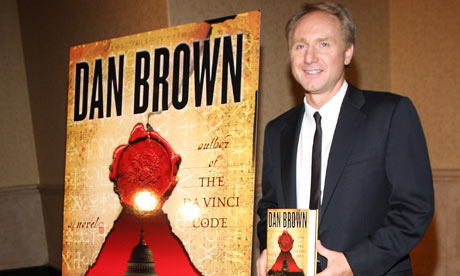
Brown contrasts Langdon and Mal'akh throughout the novel to show two extremes. One is Langdon's inability to believe or have faith in anything without seeing the facts in front of his face and the other is Mal'akh making decisions solely on faith alone. This is shown with the quotes below.
-"Because it has no basis in fact. Like I said, it’s a myth. One of many associated with the Masons." (Brown 165)
"Soon I will be leaving forever. Mal’akh knew that after tonight he would be unable to return to this place. After tonight, he thought, smiling, I will have no need for this place."
Mal'akh has that smug attitude where he knows that he will be leaving tonight. He is the exact opposite of Langdon in this way because Langdon needs evidence and facts to even consider a possibility let alone accept it, opposed to Mal'akh who acts on blind faith.
-"Despite the unexpected way it happened, the crucial pieces were falling into place. It was almost as if destiny itself were guiding tonight's events, ensuring Malakh's victory." (Brown 217)
The quote above is from when Mal'akh is completing his quest to discover the ancient portal located in Washington D.C. Mal'akh makes his own luck, and is an extremely confident character
-"Let me remind you when there was an era when even the brightest minds perceived the earth as flat. For if the earth were round, then surely the oceans would spill off. Imagine how they would have mocked you if you proclaimed, 'Not only is the world a sphere, but there is an invisible, mystical force that holds everything to its surface'!" (Brown 386)
This quote is from when Mal'akh has Langdon captured in his basement trying to explain how it is not so unrealistic because other "innovators" were mocked in the past.
- "Of course not, there's no evidence whatsoever to suggest that our Masonic forefathers built any kind of pyramid in America, much less in D.C. It's pretty difficult to hide a pyramid, especially one large enough to hold all the lost wisdom of the ages." (Brown 166).
This is when Langdon shows his inability to believe in anything other than what is right in front of his face.
Allusion:
-"Because it has no basis in fact. Like I said, it’s a myth. One of many associated with the Masons." (Brown 165)
"Soon I will be leaving forever. Mal’akh knew that after tonight he would be unable to return to this place. After tonight, he thought, smiling, I will have no need for this place."
Mal'akh has that smug attitude where he knows that he will be leaving tonight. He is the exact opposite of Langdon in this way because Langdon needs evidence and facts to even consider a possibility let alone accept it, opposed to Mal'akh who acts on blind faith.
-"Despite the unexpected way it happened, the crucial pieces were falling into place. It was almost as if destiny itself were guiding tonight's events, ensuring Malakh's victory." (Brown 217)
The quote above is from when Mal'akh is completing his quest to discover the ancient portal located in Washington D.C. Mal'akh makes his own luck, and is an extremely confident character
-"Let me remind you when there was an era when even the brightest minds perceived the earth as flat. For if the earth were round, then surely the oceans would spill off. Imagine how they would have mocked you if you proclaimed, 'Not only is the world a sphere, but there is an invisible, mystical force that holds everything to its surface'!" (Brown 386)
This quote is from when Mal'akh has Langdon captured in his basement trying to explain how it is not so unrealistic because other "innovators" were mocked in the past.
- "Of course not, there's no evidence whatsoever to suggest that our Masonic forefathers built any kind of pyramid in America, much less in D.C. It's pretty difficult to hide a pyramid, especially one large enough to hold all the lost wisdom of the ages." (Brown 166).
This is when Langdon shows his inability to believe in anything other than what is right in front of his face.
 |
| A visual representation of the contrast between good vs evil, very similar to the relationship between Langdon and Mal'akh |
Allusion:
Throughout the novel there are many allusions that are relevant to my thesis.
"The pyramid essentially represents enlightenment. It’s an architectural symbol emblematic of ancient man’s ability to break free from his earthly plane and ascend upward toward heaven, toward the golden sun, and ultimately, toward the supreme source of illumination."
This section is alluding to Icarus, that possibly the pyramid is similar to Katherine's discoveries on Noetic Science. Is it possible that the human race is flying too quickly towards the sun and will eventually burn? Or possibly this is representing Mal'akh's obsession to become immortal or above all other humans. Either way it represents a certain perseverance that Langdon clearly lacks, and Mal'akh has an excess of.
-"Langdon had always struggled intellectually with the idea of the Ancient Mysteries and their potent promise of apotheosis. Admittedly, the historical record contained indisputable evidence that secret wisdom had been passed down through the ages, apparently having come out of the Mystery Schools in early Egypt. This knowledge moved underground, resurfacing in Renaissance Europe, where, according to most accounts, it was entrusted to an elite group of scientists within the walls of Europe's premier scientific think tank - The Royal Society of London - enigmatically nicknamed the Invisible College." (Brown 161)
This allusions is to the Masons, who are an elite group that Langdon admits, could have knowledge to which no else is privileged.
- "The Ancient Mysteries are the foundation for countless legends that have survived in history - stories about powerful wisdom protected by secret guardians like the Templars, the Rosicrucians, the Illuminati, the Alumbrados - the list goes on and on." (Brown 165)
These are allusions to Dan Brown's prior novels. All of these groups existed in Langdon's adventures leading up to the Lost Symbol which is ironic considering he still won't believe in the unknown.
-"Langdon had always struggled intellectually with the idea of the Ancient Mysteries and their potent promise of apotheosis. Admittedly, the historical record contained indisputable evidence that secret wisdom had been passed down through the ages, apparently having come out of the Mystery Schools in early Egypt. This knowledge moved underground, resurfacing in Renaissance Europe, where, according to most accounts, it was entrusted to an elite group of scientists within the walls of Europe's premier scientific think tank - The Royal Society of London - enigmatically nicknamed the Invisible College." (Brown 161)
This allusions is to the Masons, who are an elite group that Langdon admits, could have knowledge to which no else is privileged.
- "The Ancient Mysteries are the foundation for countless legends that have survived in history - stories about powerful wisdom protected by secret guardians like the Templars, the Rosicrucians, the Illuminati, the Alumbrados - the list goes on and on." (Brown 165)
These are allusions to Dan Brown's prior novels. All of these groups existed in Langdon's adventures leading up to the Lost Symbol which is ironic considering he still won't believe in the unknown.

No comments:
Post a Comment